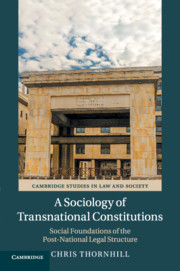A Sociology of Transnational Constitutions
This book is the second in a series of volumes on the Sociology of Constitutions. This volume focuses on the rise of transnational constitutional laws, primarily created by the interaction between national and international courts and by the domestic transformation of international law. Through detailed analysis of patterns of institutional formation at key historical junctures in a number of national societies, it examines the social processes that have locked national states into an increasingly transnational constitutional order, and it explains how the growth of global constitutional norms has provided a stabilizing framework for the functions of state institutions.
The book adopts a distinctive historical–sociological approach to these questions, examining the deep continuities between national constitutional law and contemporary models of global law. The volume makes an important contribution to the sociology of constitutional law, to the sociology of post-national legal processes and to the sociology of human rights law.
Chris Thornhill is Professor of Law at the University of Manchester. His research is mainly focused on the sociology of constitutional law, both in domestic and transnational contexts, and he has published a number of influential works in this area. His work has been published in many languages, including Chinese, Japanese, Spanish, German, and Russian.



